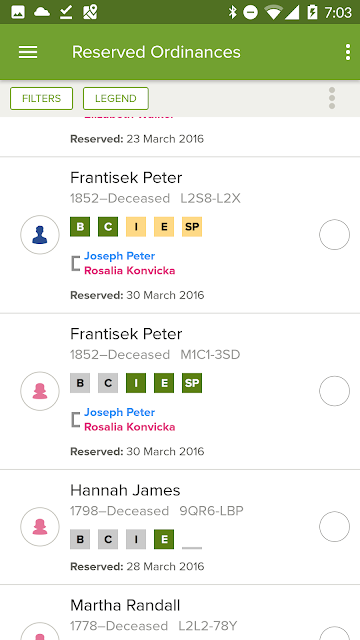After I first went through the temple for my own endowment and started doing it by proxy for the dead, I quickly decided that I was not interested in doing proxy work for people who didn’t need it, didn’t exist, or already had had it done. The endowment ceremony is almost two hours! I didn’t want to waste my time. The only way to be somewhat close to sure that my efforts were worth it and that I wasn’t wasting my time was to prepare my own names for the temple by actually doing the research.
In 2009 or so, before the Czech records came online, I found a record for a Frantisek Peter [sic] born in Moravia, who immigrated with his parents Josef Peter and Rosalie Konvicka [sic] to Texas in the first wave of Texas Czech chain migration. I input his information in FamilySearch, but accidentally clicked the wrong button for gender.
Suddenly František was a girl.
I made a new František with the same dates who was a boy and tried to merge them.
You can’t merge people of different genders.
I didn’t know how to fix it, so I reserved the name and put it on the back burner of my to-do list.
A few years ago, the temple reservation policy changed so that you can only hold names for two years. This was in order to release large amounts of names held by people who had died or who weren’t sharing. This policy makes perfect sense. It means we have to re-reserve my grandpa’s name every two years. We will not do the proxy temple work for him until my grandma passes away because we love her and want to respect her wishes.
So I went through and rereserved some names for temple work from back when I was first starting genealogy research, including this female František Peter.
Flash forward to 2017. Yesterday when we were at the temple, I accidentally selected female František from my list of reserved names, and the card was printed.
When we were in the temple, I gave some women a stack of cards for initiatories. František was in the stack. I pulled the name, suspecting it was totally incorrect, and slightly horrified that the baptism and confirmation had already been done!
I looked it up, and yes, as suspected, František born in 1852 in Tichá 97 is totally a boy. He’s not secretly Františka.
Nope, no Františka Petr in the Tichá index.
Here you can see how I re-reserved František Peter the boy, and František Peter the girl.


These are what all those little circles and colors mean. Yes, it totally feels like gamification.
From the FamilySearch app (which is excellent), I can see that there are both František the boy and František the girl in this family. The second image is scrolled down a little further, since they had many children.
How to fix it:
1. Find more information about the correct František’s life. Add the information to FamilySearch.
2. You used to not be able to delete individuals. I think you can now, but the workaround is to edit all the female František’s info so that it matches one of the sisters, and then merge those two people.
Here is a link to the original record.
I am sure that the reason I didn’t do this back in 2009 was because I couldn’t confirm the birth records in the matriky, and because I was a noobie making noobie mistakes.
The silver lining from this frustrating and embarrassing experience is that it directed my attention: here is a family that needs to be
researched. The research is very straightforward. The Czech and US sources are plentiful. It’s like… Very, very easy. Like fruit on a tree right in arm’s grasp. Low-hanging.
Think for a minute what would have happened if I had not had the background knowledge that František is a male name. We don’t have this form of the name Frank. It almost looks like it could be feminine, if you didn’t know any better. The result of ignorance: Duplicate work, sloppy tree, waste of time. Rather, a bigger waste of time than the accidental proxy baptism already was :-/
It is very, very important that Czech genealogists have some background knowledge of Czech, especially naming patterns! Your research will improve and you will be able to avoid mistakes which mess up the tree and cause problems for future researchers. You show the love and respect for your ancestors better. You have a more meaningful genealogical experience.









